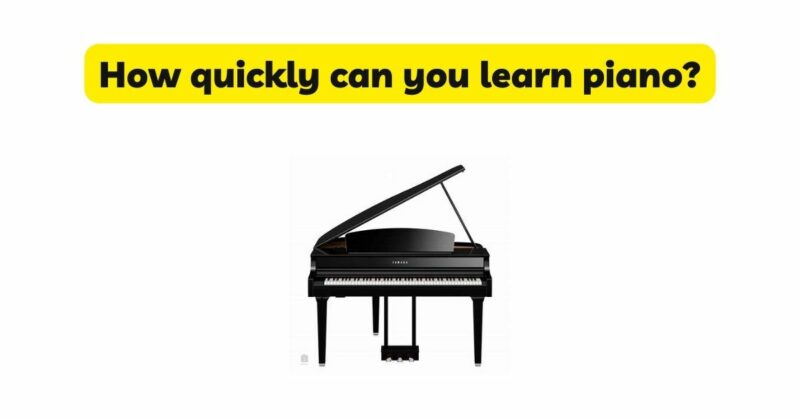Learning to play the piano is a captivating journey that unfolds at a pace unique to each individual. Aspiring pianists often wonder how quickly they can acquire the skills necessary to play proficiently. While the speed of learning varies depending on numerous factors, including prior musical experience, practice consistency, learning methods, and personal goals, this article aims to shed light on the timeline and offer insights into how quickly one can learn piano. By understanding the variables at play and adopting effective learning strategies, individuals can set realistic expectations and embark on a fulfilling and accelerated piano learning experience.
Factors Influencing Learning Speed:
- Prior Musical Experience:
Prior musical experience can significantly impact the speed at which one learns to play the piano. Individuals with previous exposure to music, such as playing other instruments or having a background in music theory, may have a head start in understanding concepts like rhythm, notation, and basic music theory. Their prior knowledge and skills can provide a foundation that accelerates the learning process. However, even those without prior musical experience can learn piano quickly through dedicated practice and effective learning techniques.
- Practice Consistency and Quality:
The consistency and quality of practice sessions are crucial factors in the speed of learning. Regular and focused practice allows for skill development, muscle memory, and retention of knowledge. Consistency is key, and dedicating regular practice time, ideally ranging from 30 minutes to an hour each day, is recommended. By consistently practicing with deliberate practice techniques and a disciplined approach, individuals can accelerate the learning process.
- Learning Methods and Resources:
The learning methods and resources utilized can influence the speed of learning. A variety of resources are available, including instructional books, online tutorials, video lessons, educational apps, and sheet music. Choosing high-quality resources that align with personal learning preferences and goals can expedite understanding, technique development, and repertoire acquisition. The utilization of efficient learning methods and seeking guidance from experienced musicians, such as piano teachers or mentors, can provide valuable feedback and personalized instruction, further enhancing the speed of progress.
- Personal Motivation and Dedication:
The level of personal motivation and dedication directly affects the speed of learning. Setting clear goals and committing to regular practice, overcoming challenges, and striving for improvement are vital components of accelerated learning. A strong desire to progress, coupled with a positive mindset and dedication to consistent practice, can expedite the learning process.
Timeline for Piano Skill Acquisition:
While the timeline for learning piano varies among individuals, several general stages can serve as a guide:
- Beginner Stage (6 months to 1 year):
During the beginner stage, individuals focus on developing basic piano techniques, hand positions, and music reading skills. This stage involves learning to play simple melodies, scales, and chords. With consistent practice, beginners can acquire a foundational understanding of the piano within 6 months to a year.
- Intermediate Stage (1 to 3 years):
In the intermediate stage, learners progress to more complex techniques, music theory concepts, and repertoire. This stage involves developing proficiency in playing scales, arpeggios, and more challenging pieces. Individuals can expand their repertoire and demonstrate a higher level of technical proficiency within 1 to 3 years of consistent practice.
- Advanced Stage (3 years and beyond):
The advanced stage encompasses a deeper exploration of advanced techniques, intricate musical interpretation, and a broader repertoire. Advancing to an advanced level typically requires several years of dedicated study, practice, and performance experience. Becoming a skilled pianist at the advanced level often involves mastery of advanced techniques, musical expression, and a diverse repertoire.
Accelerating Piano Learning:
- Establish a Structured Practice Routine:
Creating a structured practice routine is essential for accelerated progress. Set aside specific practice times each day and adhere to them diligently. Breaking down practice sessions into focused segments targeting different aspects (technique, repertoire, sight-reading, theory) helps optimize practice time and facilitates growth.
- Focus on Technique Development:
Devote time to developing proper piano techniques such as hand position, finger dexterity, and control. Incorporate targeted exercises and drills into practice sessions to strengthen finger independence, coordination, and agility.
- Utilize Effective Practice Techniques:
Make use of effective practice techniques that maximize learning and skill development. These techniques include breaking down challenging passages into smaller sections, using a metronome for accuracy and rhythm, employing slow practice for precision, and practicing with focused attention on specific challenges.
- Select Appropriate Repertoire:
Choose repertoire that suits your skill level and allows for progressive growth. Starting with simpler pieces and gradually progressing to more challenging ones ensures a balanced learning experience. Working on a diverse range of repertoire helps broaden musical understanding and enhances overall playing abilities.
- Seek Guidance and Feedback:
While self-learning, seek opportunities for guidance and feedback. Periodic check-ins with experienced musicians or piano teachers can provide valuable feedback, offer technical guidance, and address specific challenges or questions that arise during the learning process.
- Embrace a Growth Mindset:
Cultivate a growth mindset and embrace the journey of learning. Understand that progress may not always be linear, and setbacks are a natural part of the learning process. Embrace challenges as opportunities for growth and stay motivated throughout the journey.
Conclusion:
The speed at which one can learn piano depends on various factors, including prior musical experience, practice consistency, learning methods, and personal dedication. While there is no fixed timeline for acquiring piano skills, understanding these factors and adopting effective learning strategies can accelerate the learning process. The journey of piano learning is as important as the destination, with personal growth, artistic expression, and enjoyment being integral parts of the process. Embrace the piano journey, stay dedicated, and celebrate the progress made along the way. Remember that the joy of playing the piano lies not only in the destination of proficiency but also in the ongoing process of discovery, self-expression, and love for music.


